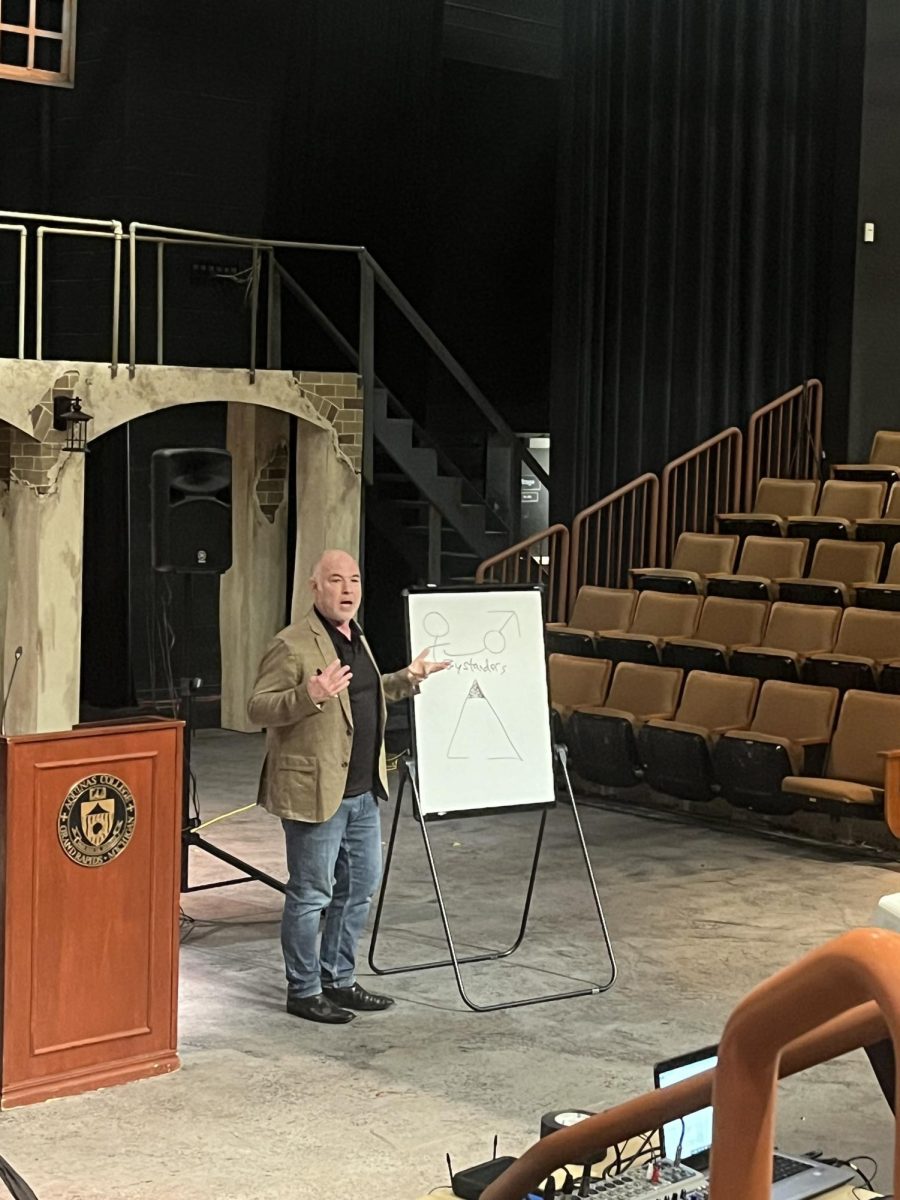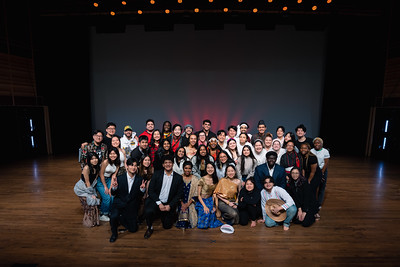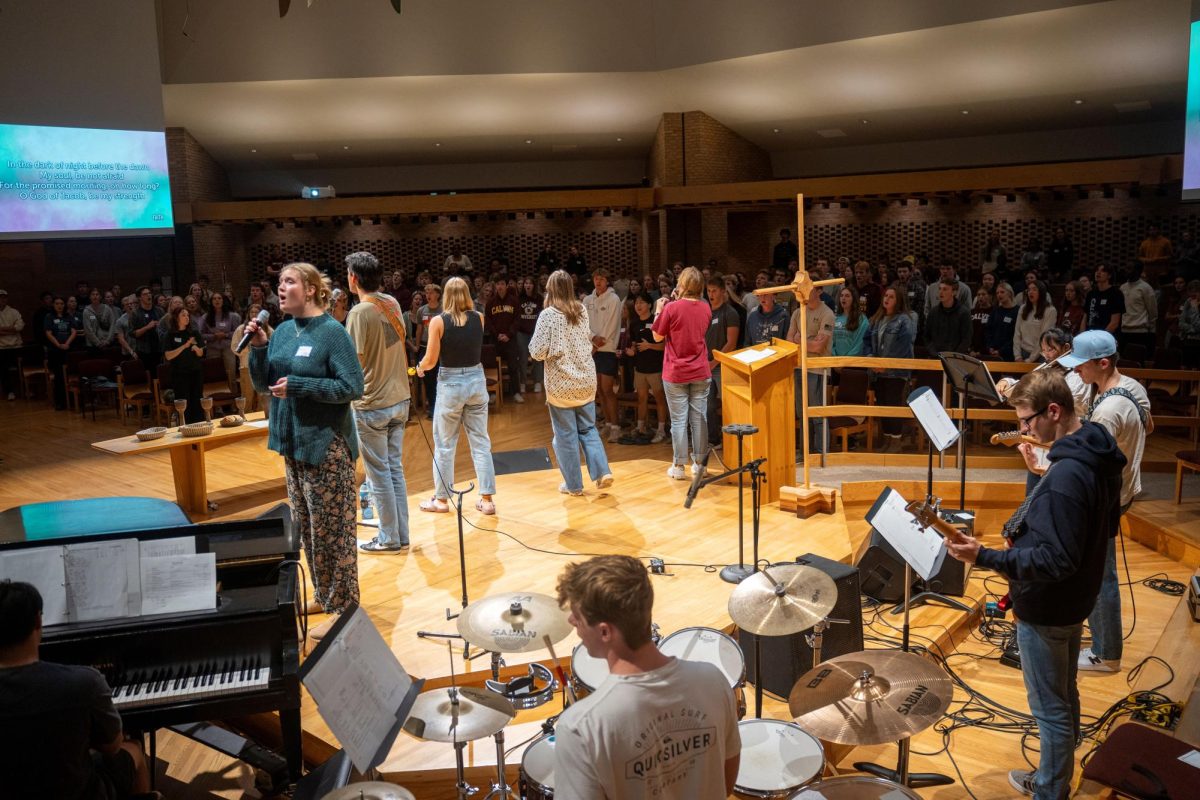“It’s embarrassing how little men’s response has been to these issues,” Jackson Katz, an educator, author, social theorist, and filmmaker, said to a room filled with more women than men during a lecture on gender-based violence given on Sept.10.
The talk, titled “Why Men’s Leadership in Gender-Based Violence Prevention is a Social Justice Imperative,” was hosted at Aquinas College, but it was open to Calvin students through Calvin’s Sociology, Social Work, and Gender Studies programs.
In 2023, there were nine cases of sexual offenses, rape, and extortion at Calvin according to Campus Safety’s Clery Act Public Crime Log.
The Problem
Katz argued during the lecture that gender-based violence, which encompasses concerns like sexual abuse and rape, is a men’s issue rather than a women’s issue, and that it is “intellectually disreputable” for men to say that because they aren’t individually perpetrators of abuse, then it isn’t their problem. Elisha Marr, professor of sociology, agreed with this sentiment, saying that though it’s not all men and we shouldn’t blame innocent people, we must recognize “who has the propensity to be in that group.”
At the talk, Katz shared that on a college campus, the “overwhelming amount” of abusers, but specifically men who have committed sexual crimes do not even realize that they have done something criminal. How does this happen?
Katz proposed a pyramid diagram of where gender-violence begins and where it ends up. At the bottom of the pyramid are small actions that are accepted in social groups, such as laughing at sexist jokes or making inappropriate comments about women’s bodies. When these sorts of things slip through the cracks, the door is opened to a community where these kinds of actions are acceptable, and this cultivates a culture where others are comfortable making sexist comments, jokes, and sexualizing women.
When this sort of behavior becomes accepted in a community, it can eventually lead to aggressions at the top of the pyramid that include rape, violence, molestation, and even murder. Katz argues that this gradual process is how rape culture has become so normalized.
The typical abuser isn’t some “sick monster” or “sociopath” that we can distance ourselves from, Katz said. Instead, typical abusers fill the same spaces we are in: they are average, everyday men. There is a deeply rooted issue with seeing these abusers as inhuman — “because we demonize them, because we dehumanize them — it’s this idea that we should just be able to beat them up or kill them, right? That makes it hard for them to seek help,” says Marr, who also attended the event and teaches on such issues herself. When this is our perspective, Marr believes that it is “one of the ways that we fail men,” as we do not have stable systems for those who are abusers to seek help.
The solution
“Stop demonizing the men who do this and recognize it as a social issue,” says Marr. Recognizing sexual and gender-based violence as a social issue allows perpetrators to understand that they need help too — and in turn, they are more likely to seek after it.
“The dominant group is rarely challenged to think about its dominance,” said Katz. When we begin to question our thoughts, values, and biases, we are confronted with the ability to reconstruct these beliefs.
To begin to reconstruct, Katz suggests “systemic solutions to systemic problems,” which he thinks can start in athletics. If institutions implement training on gender-based violence for captains and co-captains on teams, Katz believes a trickle-down effect to the rest of campus will occur.
Katz explains that currently, we use risk reduction methods of dealing with gender-based violence, but what we really need is prevention.
Men in formal leadership positions should do three things, Katz argues: create a safe environment for survivors, hold abusers accountable, and create an environment where abuse is vehemently rebuked. If those that are higher-up cultivate such a culture, the way we view rape culture can be reformed, and this same idea can be reflected on athletic teams.
The goal of gender-based violence training is to teach men how to recognize a situation that inherently relates to gender-violence culture, and to have phrases in their pocket to make it stop, such as “You wouldn’t normally say something like that,” or “You don’t want to get yourself in trouble tomorrow.” However, the training doesn’t expect participants to be infallible: even if you don’t say something in the moment, saying something the next time you see the person is still just as helpful.
Marr wants students to recognize that “this is something lifelong.” These issues can and will affect us at many different times in our lives, whether it be during campus life, in our future workplaces, or in our marriages. To move forward, Marr suggests that students go to events on gender violence, seek resources on the subject, and have conversations with those around us.














